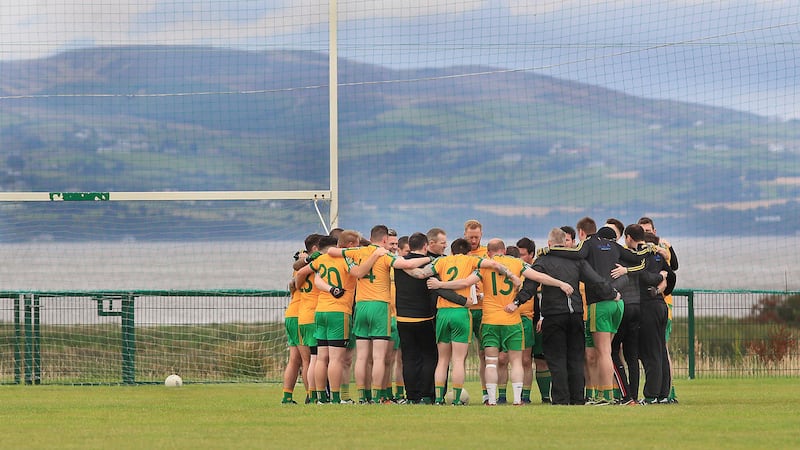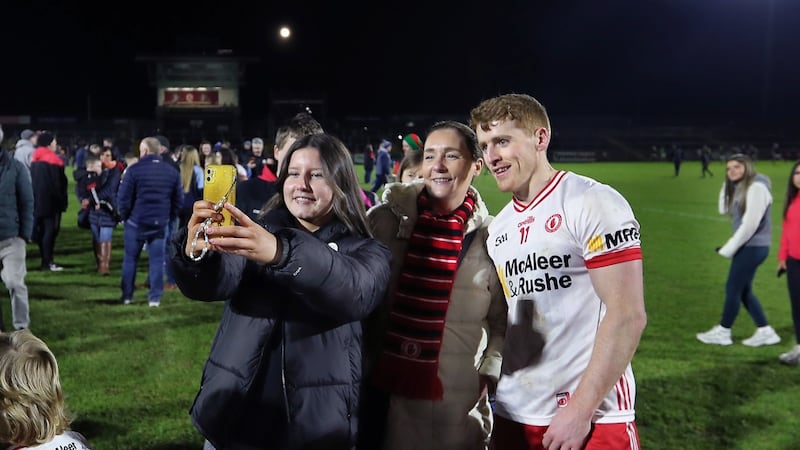“It’s ten weeks until the season probably ends at the start of October. At the minute we’ve Magherafelt this Friday night, pints after it. We’ve the Loup next Friday night, pints after it. We’ve Ardmore hopefully the Friday after that, then you’re into championship.”
THERE has been much anecdotal evidence of middle-aged retirees making a one-paced u-turn on retirement post-lockdown, but an entire club?
Right in the middle of the hypotenuse of the Cookstown-Ballinderry-Moneymore triangle sits the tiny village of Drummullan.
Down the years, the GAA has taken various guises. From Littlebridge to Drummullan to the infamous Windmill and the current guise of Ógra Colmcille, there is a long and sustained history of fielding a team, mostly against the odds.
It is one of the most remarkable villages in the north’s GAA lexicon because for almost two decades, there hasn’t been any form of housing development in the place.
The population has aged, the youth numbers have dwindled and for a lot of their history, they’ve had no form of underage team to speak of.
Indeed, to tell of former Derry captain Johnny McBride is to tell of the best player they never had.
He lived in Drummullan but Ogra had no underage team, and from school in Moneymore and then St Pius’, he was taken out to the Loup by the local Hegarty family and the rest is history.
In recent history, Ogra’s team has been held together by bandages, Kinesio tape and an unshakeable sense that they could match anyone pound-for-pound. That kept it together for years longer than their age profile should have allowed them to.
A team that had won a junior championship in 2001 still had embers flickering almost two decades on, but despite bringing in almost 60 players on transfers in recent years, the natural inhabitants had just run out of steam.
Losing by close to 40 points against Limavady two years ago sucked the heart and soul out of them.
They pulled the pin last year, initially opting out of the league with the hope of playing championship, but it never happened.
Connor Ward had long been, in his own words, the club “melter”.
“You have them in every club, that melter who sends out the first text message to get it going again. I’ve been that melter for a long number of years.”
He’d taken into coaching when he was forced to retire after being diagnosed with hypertrophic cardiomyopathy, the same condition as Fabrice Muamba and Daley Blind.
Ward had collapsed three times in an 18-month period, the final time during the club’s last game, a championship loss to neighbours Moneymore in 2018.
He won’t be pulling the boots back on himself, but while some of the kinsmen he soldiered with for a generation have found new pastures, others have been tempted back out by the short season.
Ógra Colmcille lives and breathes again.
“The condensed season has been massive for us,” says Ward.
There are no timed 400-metre runs or tackling grids.
They play football. Kicking, handpassing, games. That’s all.
The lack of variation in what they do suits the variation in what they have.
They have men turning the corner into their 40s turning up a couple of evenings a week.
One lad is only recovering after major surgery. It gives him something to do in the evenings to help build himself back up.
They’ve men transferred in from Cookstown Fr Rocks, on whom they’ve relied heavily for players in recent years along with Ballinderry, and boys out that haven’t played in almost 15 years since they were under-16.
“If you take married men, you’ve seven fellas who are married and probably wouldn’t be playing only for the fact that it’s such a condensed window.
“You have guys that are friends of coming out along with them.
“There’s the sharp end of 28, 29 players of a panel. You won’t hit them every night but if you hit them more nights than you don’t, that’s a major victory.”
They’ve entered the recreational reserve championship in Derry, a relatively new construct that includes a few thirds teams and reserve sides of clubs in an expanded junior division.
It’s as much about the social element as it is the football.
“We’d started a wee running group in Covid and it was tough times those first few weeks. Boys were out running their 5ks and 10ks.
“I know everybody made their jokes about Strava and everybody pausing times, but I got maybe a dozen lads who’d text you privately, they had maybe 20 men out doing runs, it gets you out of the house for an hour, it’s a bit of craic and it’s something to look forward to. You feel great after doing it.”
There was a personal longing too for Ward.
His eldest son Evan is imbued in the red and white of Magherafelt now.
When the Rossas won their first senior championship last year since 1978, they hit the Celtic Park pitch. It stirred something within Ward, who sent out the text message to his Ogra comrades.
Part of him wanted to implant in Evan a memory of the club his father played for.
The son was squeezed in to carry water bottles for those challenge games the last few weeks, although stopped short of going for the pints afterward.
He’ll most likely never wear the gold and green, or feel the warmth of the Sit ‘n’ Sip logo on his midriff, but he’ll remember that there was a club there.
“Those older guys, it hurt them [not playing in 2019]. It really, really hurt them. They’ve worked so hard the last number of decades to keep it going, and we just couldn’t keep it going any further.
“To be at wakes and funerals before Covid, to say we had a team back out and hoping to have that reunion game with Ardmore of the ’01 final, you could see a wee spark back in their eye that something would happen.
“It’s great to see for those men that have given everything for the club.”
The club that keeps finding new ways to survive.







